This Vending Machine in Turkey Dispenses Food for Stray Dogs and Cats When People Deposit Plastic Bottles for Recycling
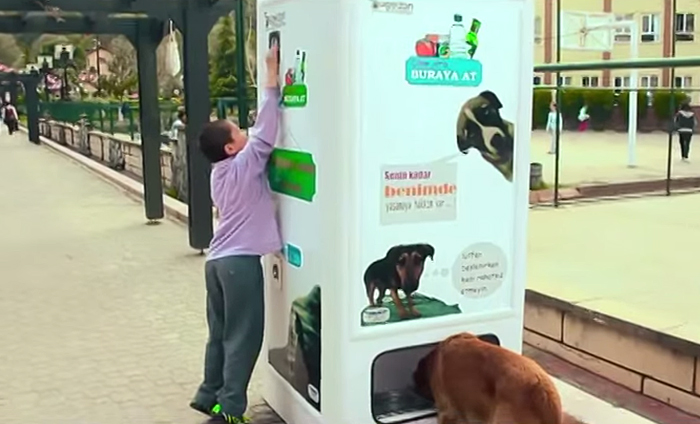
Something extraordinary happens when you drop an empty plastic bottle into a special machine on Istanbul’s busy streets. Within seconds, food appears at the bottom – not for humans, but for four-legged residents who call these sidewalks home. What seems like magic actually represents one of the most brilliant solutions to two massive urban problems that cities worldwide struggle to solve.
Imagine walking through streets where hundreds of thousands of stray animals roam freely, searching for their next meal while dodging traffic and harsh weather. Picture plastic waste choking waterways and filling landfills because recycling systems can’t keep up with consumption. Now imagine a simple device that transforms one problem into the solution for another.
Someone in Turkey figured out how to turn environmental waste into animal welfare, creating a system so elegant that dozens of countries have already adopted it. But how does this innovation work? What drove its creation? And why are cities around the world racing to install these remarkable machines?
One company’s solution would challenge everything we think we know about urban planning, environmental responsibility, and community compassion.
Istanbul’s 400,000 Four-Legged Citizens Need Help
Istanbul houses 15 million human residents, making it Europe’s largest city by population. But those official numbers don’t include the estimated 400,000 stray dogs and cats who also call these streets home. Countless animals wander through neighborhoods, parks, and business districts, creating one of the world’s largest urban wildlife populations.
Unlike many cities where stray animals face immediate removal or euthanization, Istanbul’s relationship with street animals reflects deep cultural values. Residents generally view these creatures as part of their community fabric rather than problems requiring elimination.
Documentary filmmaker Elizabeth Lo observed this cultural shift, noting: “People really see a dignity in the dogs, they see them as fellow citizens, as belonging to their streets and communities.”
But acceptance doesn’t solve hunger. Hundreds of thousands of animals need daily food and water to survive harsh urban conditions. Traditional feeding methods rely on individual kindness and sporadic charity efforts that can’t sustain such massive populations consistently.
When 80,000 Dogs Died on an Island
Istanbul’s approach to stray animals hasn’t always reflected such compassion. In 1911, city governors attempted a brutal “solution” that created one of history’s worst animal welfare disasters.
Officials ordered the removal of all stray dogs to Sivriada, a nearby barren island. Approximately 80,000 dogs were transported there and abandoned without food, water, or shelter. Most died from starvation and dehydration within weeks. Others drowned attempting to swim back to the mainland.
Local residents viewed a severe earthquake that followed shortly after as divine punishment for abandoning the animals. Public horror over the mass death transformed attitudes toward stray animal management, creating determination to find humane alternatives.
For over a century since, officials and citizens have searched for solutions that balance urban management needs with animal welfare concerns. Multiple approaches have been tried, but none achieved the elegant simplicity that would eventually emerge.
Two Problems, One Brilliant Solution
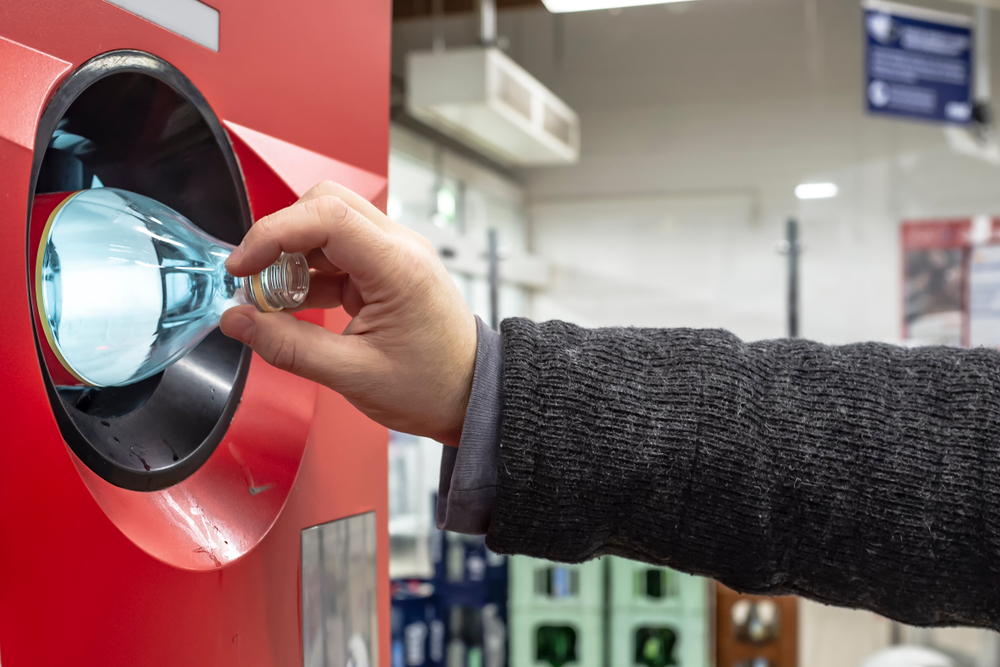
In 2014, Turkish company Pugedon introduced an innovation that would revolutionize urban animal care while addressing environmental challenges simultaneously. Their “Smart Recycling Boxes” created the first self-sustaining system for feeding stray animals through community participation.
Solar-powered vending machines require no city funding or ongoing operational costs. Citizens deposit empty plastic bottles at the top, triggering automatic food dispensing at the bottom where hungry animals can easily access it.
“The benefits of the vending machine are supposed to be twofold: encourage recycling and feed the city’s strays,” explains the system’s dual-purpose design.
Each machine includes a water dish where users can pour remaining liquid from bottles before recycling them. Revenue from recycled plastic covers the cost of dispensed food, creating a completely self-sustaining operation.
Turkey’s Plastic Problem: Only 6% Gets Recycled
Turkey generates 3.7 million tons of plastic waste annually, but only 6% receives proper recycling treatment. Compare that shocking rate to countries with established recycling infrastructure, and the environmental crisis becomes clear.
Of the remaining plastic waste, 61% goes directly to landfills while 33% – over 1.1 million tons – remains uncollected or gets dumped openly. Environmental damage from poor waste management creates ongoing public health and ecological threats.
Pugedon machines address this crisis by creating immediate incentives for plastic bottle recycling. Citizens receive instant gratification from helping animals while contributing to environmental cleanup efforts.
Economic value from recycled materials funds the animal feeding program, proving that environmental responsibility and social welfare can support each other financially.
From Trash Raids to Clean Feeding
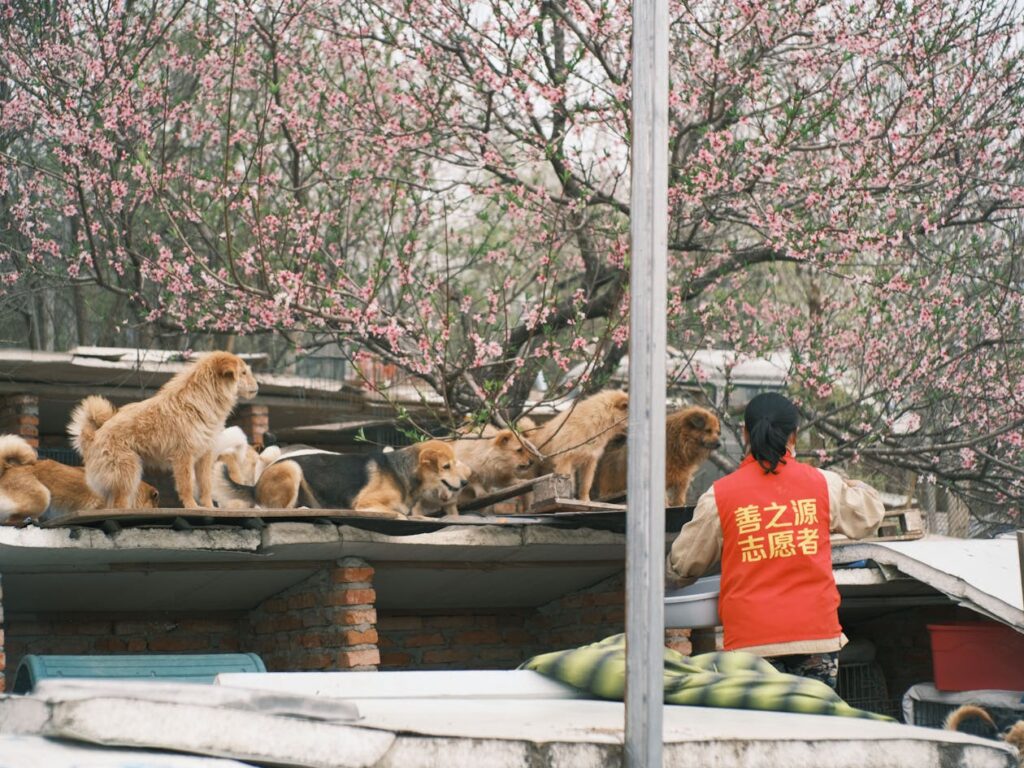
Ankara, Turkey’s capital city, installed Pugedon machines with remarkable results that exceeded all expectations. City hall representative Mahmet Tadri documented dramatic improvements in both animal welfare and neighborhood cleanliness.
“Before this machine was set up, stray animals went through the trash. However, they now come here and eat, and subsequently, the neighborhood has become cleaner,” Tadri explained about the transformation.
Stray animals no longer need to tear open garbage bags or scatter trash while searching for food scraps. Regular feeding reduces desperate foraging behaviors that create litter and unsanitary conditions.
Most importantly, animal health improved measurably. According to Tadri, “the mortality rate of stray dogs has fallen by 10 to 12 percent” since machine installation in Ankara.
Reduced mortality rates prove that consistent nutrition access directly saves animal lives. Regular feeding strengthens immune systems and helps animals survive harsh weather, disease, and urban dangers.
No-Cost City Solution
Pugedon machines operate entirely on solar energy, eliminating ongoing electricity costs for municipal governments. Self-contained systems require minimal maintenance while providing continuous service regardless of power grid issues.
Cities can install machines without budget allocations or ongoing operational expenses. Revenue from recycled bottles covers food costs, creating genuinely sustainable programs that don’t strain public resources.
Solar power enables installation in remote areas without electrical infrastructure. Parks, suburban neighborhoods, and industrial districts can all benefit from animal feeding programs previously impossible due to power requirements.
Environmental sustainability extends beyond recycling to include clean energy operation. Machines demonstrate how renewable energy can power social welfare programs while reducing carbon footprints.
29 Countries Embrace Innovation
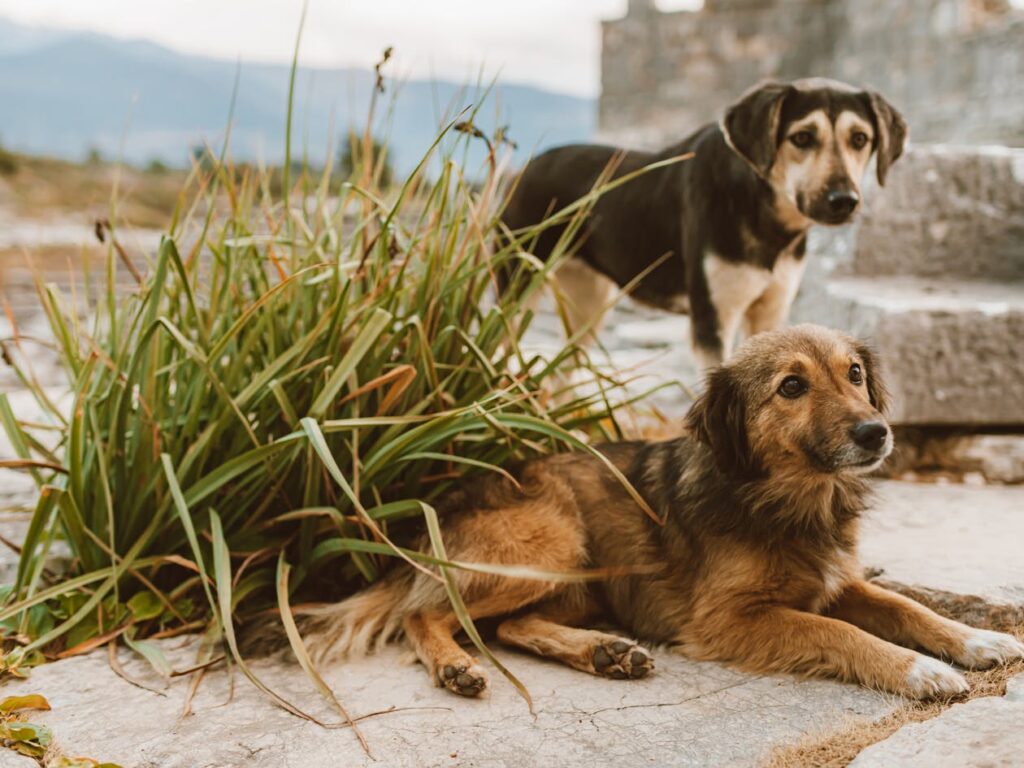
Pugedon’s success attracted international attention, leading to rapid global expansion. Company reports indicate exports to 17 countries with distribution networks established in 8 nations.
Joint projects with 182 municipalities and 3 ministries demonstrate government acceptance of the innovation. Official partnerships validate the technology while ensuring proper integration with existing urban services.
In 2017, Pugedon earned an Index Award recognizing companies that “use design to solve problems that matter.” International recognition helped accelerate adoption by showcasing proven results and environmental benefits.
Twenty-nine countries have now implemented similar programs, proving that the concept transcends cultural and economic boundaries. Urban areas worldwide face comparable challenges with stray animals and plastic waste management.
Pugedon’s Comprehensive Animal Welfare Mission
Pugedon operates as more than just a vending machine company. Their broader mission includes weekly regular feeding programs for street animals in areas without machine coverage.
Free food and medicine supplies go to volunteer caregivers who dedicate personal time to animal welfare efforts. Supporting existing volunteers amplifies impact while recognizing community members already helping stray populations.
No-cost animal transportation services help move sick or injured animals to veterinary care. Emergency medical access often determines survival for animals facing accidents or serious illness.
Educational seminars in public schools teach children about animal welfare and environmental responsibility. Youth education creates long-term cultural change while building next-generation environmental consciousness.
Turkey’s Humane Population Control
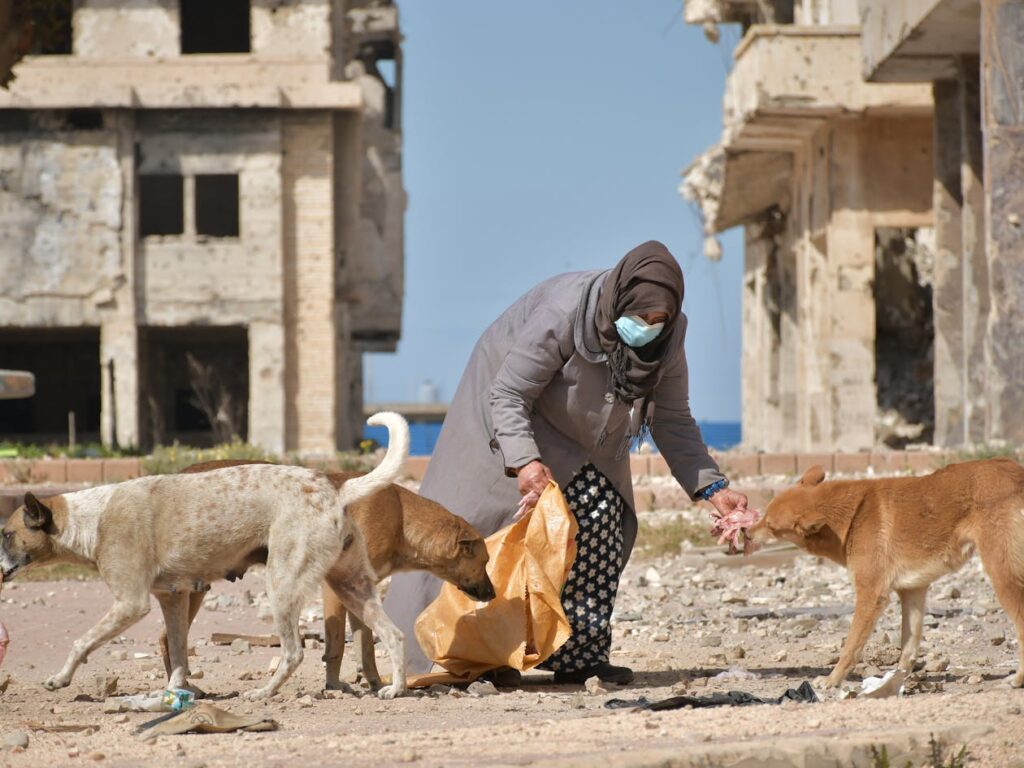
Turkey adopted comprehensive “Neuter and Release” programs that address population growth humanely while maintaining animal dignity. Mobile veterinary clinics visit each area twice yearly for intensive intervention periods.
Veterinarians provide sterilization, vaccination, and identification services during 2-3 day visits. Systematic coverage ensures all animals receive necessary medical care while preventing future reproduction.
Population control through sterilization eliminates the need for euthanization or removal programs. Animals remain in familiar territories while reproduction rates decline naturally over time.
Medical care during capture improves overall population health and reduces disease transmission. Vaccination programs protect both animal and human health through prevention of rabies and other zoonotic diseases.
Turning Passersby Into Animal Heroes
Pugedon machines transform ordinary citizens into daily heroes through simple actions requiring minimal effort. Anyone walking by with an empty bottle can immediately help hungry animals while contributing to environmental cleanup.
No special skills, significant time commitment, or financial contribution is required. Accessibility enables participation across all age groups, income levels, and physical abilities.
Visible impact creates emotional satisfaction and community connection. Users see direct results from their actions, reinforcing positive behaviors and encouraging repeat participation.
Environmental consciousness links to animal compassion, creating broader awareness of interconnected urban challenges. Citizens begin recognizing how individual actions contribute to multiple community improvements simultaneously.
Innovation for Social Good
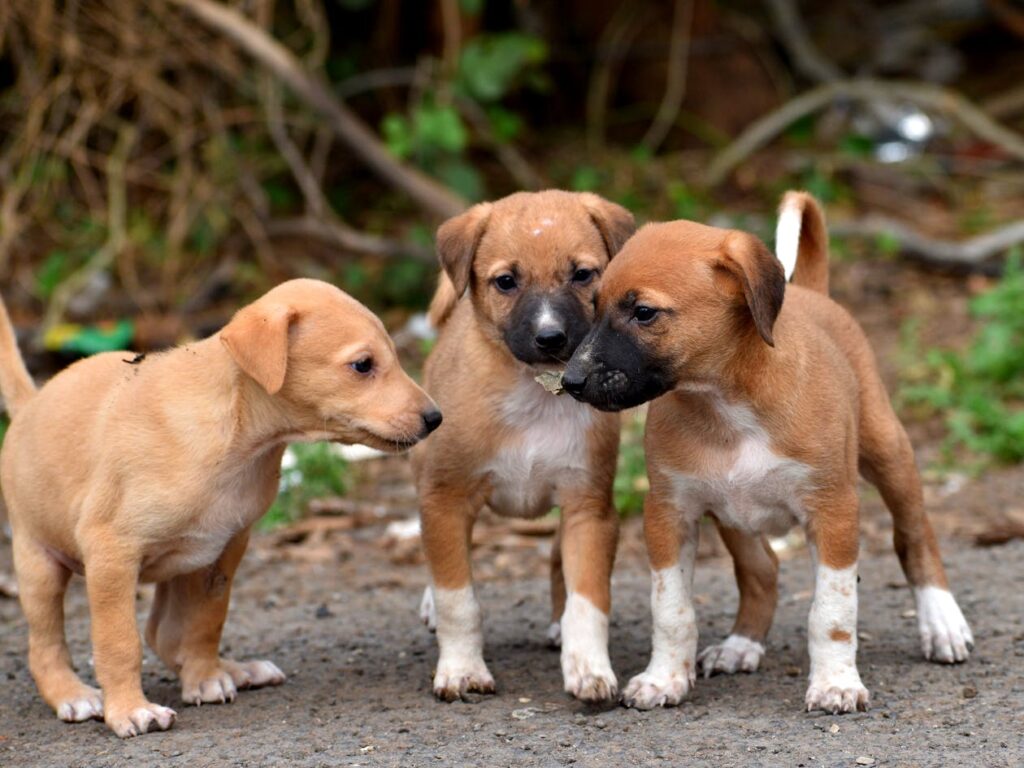
Pugedon represents successful integration of technology with social responsibility. Research and development capabilities create commercially viable solutions for pressing social problems.
Corporate structure combines profit motives with environmental and welfare goals. Business success depends on positive social impact, aligning financial incentives with community benefits.
Engineering innovation serves humanitarian purposes while maintaining economic sustainability. Technical sophistication supports simple user interactions that maximize accessibility and effectiveness.
Design thinking approaches urban challenges creatively rather than accepting traditional limitations. Problem-solving methodology demonstrates how constraints can inspire breakthrough innovations.
Data Behind Innovation
Quantifiable results validate Pugedon’s effectiveness through measurable improvements in animal welfare and environmental metrics. Mortality rate reductions provide concrete evidence of life-saving impact.
Neighborhood cleanliness improvements demonstrate broader community benefits beyond direct animal feeding. Reduced garbage disruption creates more pleasant living environments for human residents.
Increased recycling rates in installation areas contribute to environmental protection goals. Plastic waste diversion reduces landfill burden and environmental contamination.
Community satisfaction surveys show public approval for stray animal management approaches that prioritize welfare over removal. Positive feedback encourages program expansion and long-term sustainability.
Simple Actions, Profound Impact: One Bottle at a Time
Individual responsibility meets collective animal welfare through accessible participation opportunities. Small personal actions aggregate into significant community-wide improvements.
Immediate gratification from helping combines environmental benefits with emotional satisfaction. Positive feedback loops encourage continued participation and community engagement.
Accessible heroism enables people of all backgrounds to contribute meaningfully to social causes. Democratic participation breaks down barriers that typically limit charitable involvement.
Demonstration that small actions create meaningful change inspires broader civic engagement. Success with simple programs builds confidence in tackling larger community challenges.
Pugedon machines prove that innovation can emerge from recognizing connections between seemingly separate problems. By linking environmental responsibility with animal welfare, one company created a solution that addresses multiple urban challenges while requiring minimal resources and maximum community participation.
Cities worldwide continue adopting these remarkable machines, transforming plastic waste into lifelines for street animals while building stronger, more compassionate communities one bottle at a time.
Featured Image credits: nowiknow.com
Loading...

